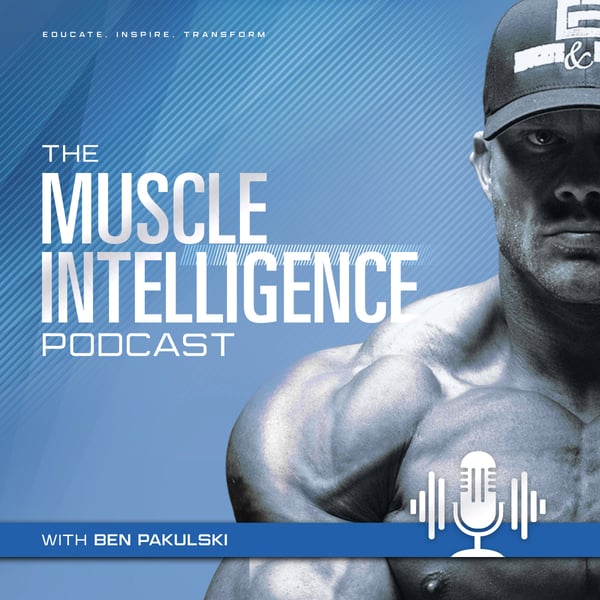How to Regulate Blood Sugar for Body Composition & Longevity with Dr. Casey Means #342
Muscle Intelligence
Ben Pakulski
4.8 • 745 Ratings
🗓️ 24 July 2023
⏱️ 77 minutes
🧾️ Download transcript
Summary
If you’re a man over 35 looking for a simple, effective and personalized plan to help you look, feel and perform better than you did in your 20s, head to https://muscleintelligence.com/mipapply to learn more about our upcoming programs.
Today's guest, Casey Means, MD is a Stanford-trained physician, Chief Medical Officer and Co-founder of metabolic health company Levels, and Associate Editor of the International Journal of Disease Reversal and Prevention.
Dr. Means's mission is to maximize human potential and reverse the epidemic of preventable chronic disease by empowering individuals with tech-enabled tools that can inform smart, personalized, and sustainable dietary and lifestyle choices.
In today's episode, Dr. Means offers an incredible lesson into everything from how to most effectively use a continuous glucose monitor (CGM), to the five key lab tests for top metabolic insight, to her top tools for sustaining mitochondrial health long-term.
My team has also compiled the key tools for using CGMs and managing metabolic health in this episode's implementation guide.
You'll Learn:
- The #1 Tool for Real-Time Metabolic Health Insights
- How to Build Meals that Mitigate Glucose Spikes
- Five Important Metabolism Tests to Order from Your Doctor
- The Six BIGGEST Levers to Pull for Mitochondrial Health
- How to Avoid the #1 Cause of Chronic Disease & THRIVE Instead
P.S. After listening to today's episode, if you're ready to take action on improving your metabolic health, head over to levels.link/MUSCLE for a special offer to our community.
Transcript
Click on a timestamp to play from that location
| 0:00.0 | You could have 50 people tell you not to eat honeynut chiroes for breakfast and that eggs and avocado and spinach would be a better option. |
| 0:07.3 | But until you see your glucose going up 120 points in 15 minutes and then crashing down 45 minutes later, leaving you feeling lethargic and tired and anxious and have more cravings for sugar. |
| 0:21.7 | Like, there's nothing that compares to that, to seeing your body generate sort of that |
| 0:26.4 | motivating information. |
| 0:35.0 | Welcome back to the Muscle Intelligence podcast. |
| 0:38.1 | This is Ben Bikolsky. |
| 0:39.3 | I'm the host with Most trying to get you healthy, get you fit, get you happy, all the above. |
| 0:46.4 | There's so many things that tie into optimization of self, whether it be physical optimization |
| 0:52.8 | through training, through aerobic fitness, through |
| 0:56.4 | mobility work, metabolic optimization, through nutrition, through lifestyle interventions, |
| 1:01.9 | through stress management. Sometimes it can be really confusing, overwhelming, and certainly |
| 1:06.8 | daunting to determine what action to take, which one's a big lever, which one's a small |
| 1:11.3 | lever. Today I'm going to share with you one of the biggest levers that I've personally worked |
| 1:15.4 | with a lot over the last probably five years or so. And that's called a continuous glucose monitor. |
| 1:23.7 | You may see people wearing them on the back of their arm. Many people assume that I'm diabetic or something when they see me wearing it, but no, |
| 1:29.6 | I'm just a huge nerd trying to figure out how to understand my metabolism, |
| 1:33.3 | understand ultimately behavior change when it comes to nutritional interventions. |
| 1:37.6 | So I have this belief that nutrition is more of a behavior problem than is a food problem |
| 1:42.0 | if left to make the decision between |
| 1:46.6 | high-calorie foods and low-calorie foods, I think every human in this world, at least most, |
| 1:51.1 | are going to unconsciously choose the high-calorie food simply because high-calorie foods have |
| 1:56.2 | kept us alive for hundreds and thousands of years, if not millions of years, and that's what we're |
... |
Please login to see the full transcript.
Disclaimer: The podcast and artwork embedded on this page are from Ben Pakulski, and are the property of its owner and not affiliated with or endorsed by Tapesearch.
Generated transcripts are the property of Ben Pakulski and are distributed freely under the Fair Use doctrine. Transcripts generated by Tapesearch are not guaranteed to be accurate.
Copyright © Tapesearch 2025.

